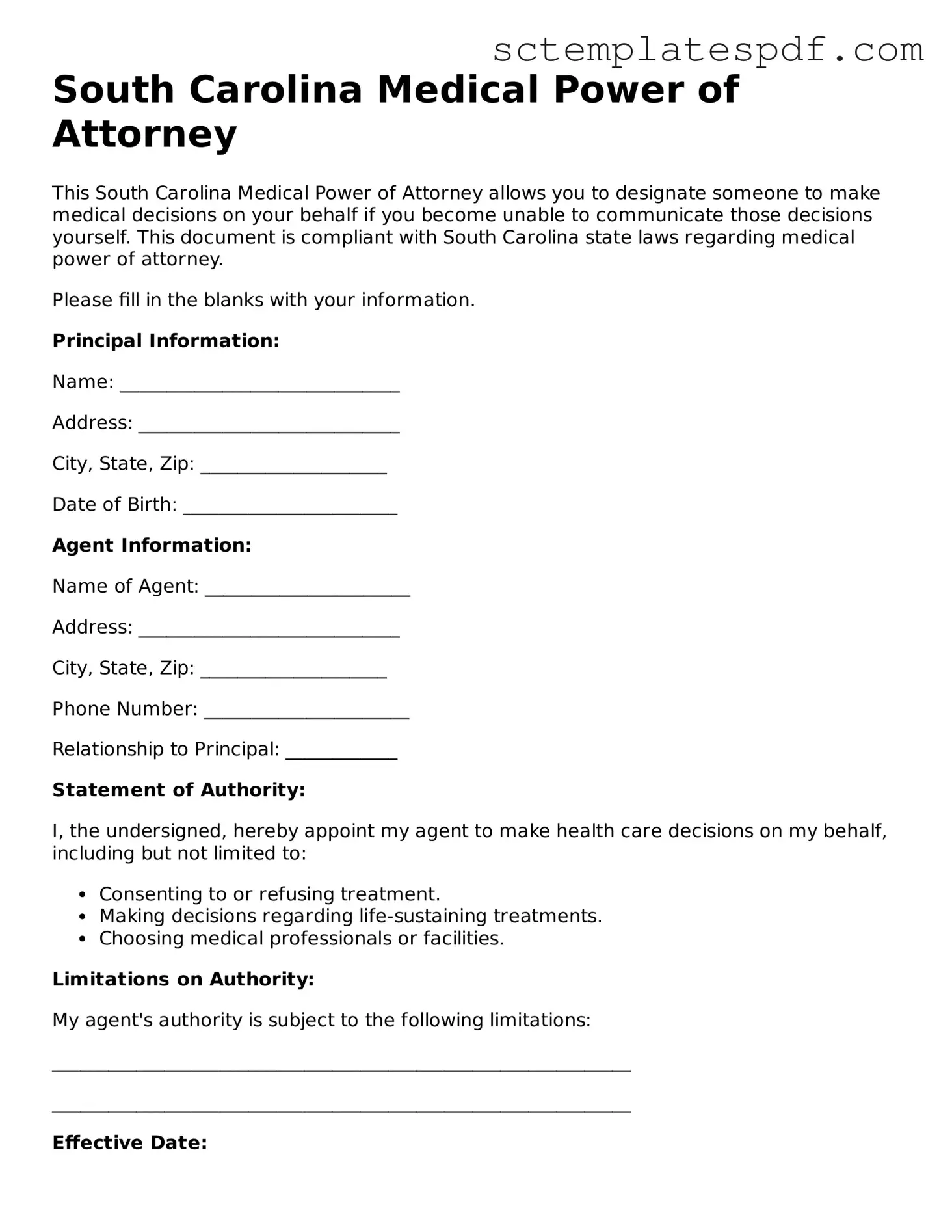Valid South Carolina Medical Power of Attorney Document
In South Carolina, a Medical Power of Attorney (MPOA) is an essential legal document that empowers individuals to make healthcare decisions on behalf of another person when they are unable to do so themselves. This form allows you to designate a trusted person—often referred to as your agent or healthcare proxy—who will have the authority to make medical choices that align with your values and wishes. It is crucial to select someone who understands your preferences and can advocate for your best interests in medical situations. The MPOA covers various aspects of healthcare, including decisions about treatment options, medications, and end-of-life care. By completing this form, you ensure that your healthcare choices are respected, even if you cannot communicate them directly. Understanding the importance of this document can provide peace of mind for both you and your loved ones, knowing that your healthcare decisions will be in capable hands when it matters most.
Key takeaways
- Understand the Purpose: A Medical Power of Attorney allows you to designate someone to make healthcare decisions on your behalf if you are unable to do so.
- Choose Your Agent Wisely: Select a trusted individual who understands your values and wishes regarding medical treatment.
- Be Specific: Clearly outline the types of medical decisions your agent can make. This may include choices about life-sustaining treatment or other specific healthcare preferences.
- Sign and Date: Ensure that you sign and date the form in the presence of a notary public or witnesses, as required by South Carolina law.
- Keep Copies Accessible: After completing the form, provide copies to your designated agent, family members, and healthcare providers to ensure they have access when needed.
- Review Regularly: Revisit your Medical Power of Attorney periodically, especially after significant life changes, to ensure it still reflects your current wishes.
- Understand Revocation: Know that you can revoke or change your Medical Power of Attorney at any time, as long as you are mentally competent to do so.
Dos and Don'ts
When filling out the South Carolina Medical Power of Attorney form, it is essential to follow certain guidelines to ensure that the document is valid and effective. Below are five things you should do and five things you should avoid.
Things You Should Do:
- Clearly identify the person you are appointing as your agent.
- Provide your agent with detailed instructions about your healthcare preferences.
- Sign the form in the presence of a notary public.
- Ensure that you are of sound mind when completing the document.
- Keep a copy of the signed form in a safe place and share it with your agent and family members.
Things You Shouldn't Do:
- Do not use vague language that could lead to confusion about your wishes.
- Avoid appointing someone who may have conflicts of interest in your healthcare decisions.
- Do not forget to date the form when you sign it.
- Refrain from making changes to the document without proper legal guidance.
- Do not neglect to review and update the document as your circumstances change.
Guidelines on Utilizing South Carolina Medical Power of Attorney
Filling out the South Carolina Medical Power of Attorney form is an important step in ensuring that your healthcare wishes are respected. Once completed, the form allows you to designate someone you trust to make medical decisions on your behalf if you become unable to do so. Follow these steps carefully to complete the form accurately.
- Begin by downloading the South Carolina Medical Power of Attorney form from a reliable source or obtain a physical copy from a legal office.
- At the top of the form, fill in your full name, address, and date of birth in the designated spaces.
- Next, identify the person you are appointing as your agent. Provide their full name, address, and phone number. Ensure this person is willing to accept this responsibility.
- Specify any limitations or specific powers you wish to grant your agent. If there are no limitations, you can indicate that your agent has full authority to make decisions.
- In the next section, include your preferences regarding life-sustaining treatment. Clearly outline your wishes, if applicable.
- Sign and date the form at the bottom. Your signature should be placed in the presence of a notary public or two witnesses, depending on the requirements.
- If using witnesses, ensure they are not related to you or beneficiaries of your estate. They must also sign and provide their information on the form.
- Finally, make copies of the completed form. Keep one for your records and provide copies to your agent and any healthcare providers involved in your care.
Other Popular South Carolina Forms
South Carolina Eviction Laws - A Notice to Quit is an important step in protecting the landlord's financial interests.
A Missouri Quitclaim Deed is a legal document used to transfer ownership of real estate from one party to another without guaranteeing that the title is clear. This form is often utilized in situations where the parties know each other, such as family transfers or divorces. If you need to complete a Quitclaim Deed, you can find the necessary forms by visiting Missouri PDF Forms to get started.
Free Printable Golf Cart Bill of Sale - Ensures that both parties commit to their stated obligations regarding the sale.
